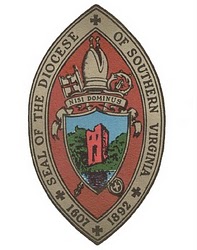The Diocese of Southern Virginia announced this afternoon that the location for the consecration of its new bishop, The Rev. Susan Haynes, has been moved. In a statement available on the diocesan website, the Bishop-Elect writes that,
The decision to change the location from St. Bede Catholic Church in Williamsburg arose out of concern and respect for the ministries and leadership of both the Catholic parish and the Catholic Diocese of Richmond. Learning that its intended use of the building was causing dismay and distress, the Episcopal Diocese withdrew from its contract with St. Bede. As Bishop- Elect Haynes observed, “in the 8th chapter of his first letter to the Corinthians, the Apostle Paul cautioned Christians to be careful about pursuing behavior that might cause problems for others within their community.”
In her letter to Bishop Knestout, bishop of the Catholic Diocese of Richmond, and Monsignor Lehman, pastor of St. Bede, Bishop-Elect Haynes wrote, “I am writing to withdraw from our contract to use the lovely, holy space of St. Bede for my upcoming consecration as the 11th bishop of the Episcopal Diocese of Southern Virginia. We have so appreciated and admired your grace and courage in extending this hospitality and abiding by your invitation even under fire from those within your own flocks.”
The dismay and distress to which Rev. Haynes refers includes an online petition, which has some 3000 signatures, protesting the use of St. Bede’s building for what many consider an “illegal” consecration. The LifeSite news site reported earlier in the week that the objections were mainly due to the long-held Roman Catholic opinion that Anglican orders are invalid, Haynes’ own gender, and the Episcopal Church’s commitments to including LGBTQIA+ individuals.
“In his statement, [St. Bede pastor] Msgr. [Joseph P.] Lehman opens by referring to the use of St. Bede’s by the Episcopal Diocese of Virginia for ‘the consecration of their new bishop.’ Already there is a serious problem because what is taking place is not a consecration, and the woman at the center of the ceremony is not, [and] will not be a ‘bishop,’” Michael Hichborn, President of the Lepanto Institute, told LifeSiteNews.
Hichborn is planning a public rosary in reparation for the February 1 event.
“Any Catholic who would attempt to ordain or consecrate a woman would incur the penalty of excommunication, laetetia sententiae, so why is a Protestant organization attempting the same thing being permitted to conduct such a mockery inside a Catholic Church?” he asked. “Can Msgr. Lehman and Bishop Knestout not see the scandalous inconsistency in such permission?”
“This is as much of a desecration as if the bishop had permitted a Protestant same-sex ‘wedding’ to take place in a Catholic Church,” he said.
Hichborn’s statement was in response to support for the service from both Monsignor Lehman and Bishop Barry Knestout of the Richmond diocese. Bishop Knestout released a letter on January 15 defending the planned service, in which he wrote:
I would encourage you to review the following teachings of the Church on ecumenism and norms for ecumenical activities and cooperation The Decree on Ecumenism Unitatis Redintegratio from the Second Vatican Council, especially #1 and #3 speak of the importance of ecumenical dialogue and outreach. In addition, the Directory for the Application of Principles and Norms on Ecumenism #137 gives clear guidelines and recommendations regarding the possibility of sharing space with our separated brothers and sisters.
Finally, the Directory for the Pastoral Ministry of Bishops #207 indicates the importance of concrete acts of ecumenism on the part of the bishop.
Catholic News Agency further reports that St. Bede’s was considered for practical reasons.
Lehman indicated that St. Bede was approached to host the ordination because it has a seating capacity of 1,200, a social hall and catering kitchen, plus “ample parking.” All of St. Bede’s parish campus is handicapped accessible.
The two Episcopal churches located in Williamsburg have seating capacities of 380 and 225.
We look forward to continuing our ecumenical dialogue with the Episcopal community, and to working with Bishop-Elect Haynes in fortifying the long standing, cordial relationship between our communities and our joint service to the poor.
As I assure Bishop-Elect Haynes of my prayers for her and the community she leads, I ask our Catholic faithful to pray for them, too, and to pray that the fruits of the Holy Spirit, along with humility, kindness, gentleness and joy, be expressed and strengthened in all our faith communities.
(The ecumenical dialog referred to in this conversation, LARCUM, takes place among the Evangelical Lutheran, Episcopal, Methodist, and Roman Catholic dioceses, conferences and synods in Virginia. The committee’s website is available here.)

